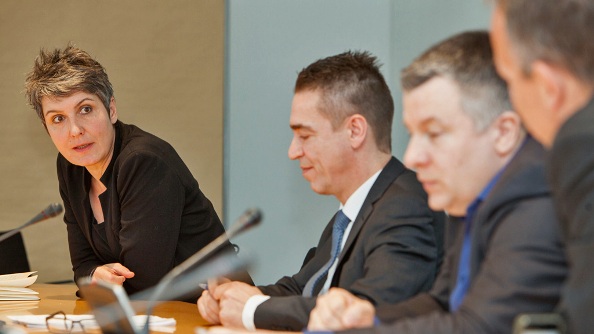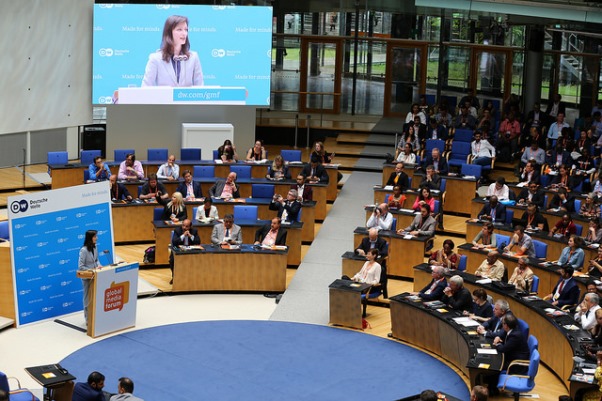Search Results for Tag: Charlie Hebdo
Four things you may have missed at the 2018 DW Global Media Forum
The 2018 Global Media Forum wrapped up last week with over 2,500 guests from all over the world gathering in Bonn for three days of learning and networking. You probably caught the keynote speeches, and the DW Freedom of Speech Award , but here are four events at the 2018 Global Media Forum you may have missed.
1. Peace With the Taliban: A Compromise on Human Rights?
On Tuesday, former Afghan President Ahmed Karzai was joined by DW journalists and the German envoy to Afghanistan to discuss the potential for peace with the Taliban in a country beset by continuous conflict. The discussion provided first-person insight into a complicated and unstable region from someone who has played an integral part in its politics.
2. Reporting terror: Who sees what, when and why?
Four journalists with experience in reporting from crisis regions around the world gathered for a panel discussion on Monday to discuss how stories about terrorism are portrayed unequally in the media. For example, the Charlie Hebdo attack dominated the media, while 2,000 people killed by terrorists in Nigeria at the same time didn’t make the news cycle. The panel provided a riveting, inside look at challenges and dangers of delivering information from dangerous areas while looking for an audience.
3. Threats and opportunities of increasing isolationism to international power relations
At a plenary discussion on Tuesday, a panel of prominent journalists and academics discussed the trend of isolationism, especially with Donald Trump’s “America First” politics. One speaker discussed the danger of the US losing soft power on the world stage and being ignored internationally. The panel provided a preview of a future that looks a lot different than today.
4. Lie Detectors
The final day of the Global Media Forum was devoted to media innovation. As part of the Innovation Lab day, DW Akademie invited the media competence organization Lie Detectors, which goes to schools and teaches children media literacy and how to spot fake news stories from real reporting. As online news and social media are the primary sources for a new generation of media users, this service will become even more valuable.
‘Be brave and ask questions that agitate’

When terrorists attacked Charlie Hebdo, Ines Pohl was the editor in chief of alternative Berlin daily Die Tageszeitung (taz), known for going against the mainstream and breaking taboos. As she and her colleagues absorbed the news of the massacre, Pohl said she wondered if taz would be next. But instead of giving in to fear, she decided that taz would publish the first Charlie Hebdo cover after the attack, which controversially portrayed the Muslim prophet Mohammed. Pohl said that it was the duty of journalists to “hold back this fear and stand up for our free democracies.”
Now as editor in chief at DW, Pohl will bring this courageous spirit and an innovative attitude to DW’s journalism.
Before becoming editor in chief, Pohl was DW’s Washington correspondent. During the 2016 US presidential campaign, she helped lead the social media project #Whatamerica. Using short video interviews and vox pops, the project shared a unique perspective on how American’s envision the political future of the US. It was also something new for DW and it demonstrated the success of engaging with the audience to tell better stories.
“The current election in the USA is an example of an increasingly polarized and short-winded media landscape,” said Pohl. “Without Twitter and Facebook there would be no Donald Trump. He lives off of scandalizing, and a hunger for quotas. Nuanced and bold reporting is poison for politicians like him.”
Pohl has a built a long career in journalism and while she emphasizes the importance of digital media, she also understands that interacting with people face-to-face is an essential aspect of being a journalist. “This is where I am more traditional,” she said. “Whenever possible, I think a conversation should begin with a handshake. This can say so much more than a thousand words in e-mails.”
Under Pohl’s the direction the future for DW’s journalism is in the hands of a forward thinking journalist who is not afraid to take chances. Pohl says DW gives her “the privilege to be able to work for quality and not for quotas.” She especially values the international perspective at DW and will seek to promote a multimedia atmosphere and experimentation more with of social media.





Feedback